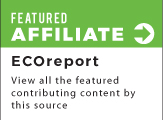

Global businesses are increasingly pledging to obtain key commodities only from sources that do not contribute to deforestation. Now, nonprofit groups are deploying data tools that help hold these companies to their promises by tracing the origins of everything from soy to timber to beef.
It was only a 20-minute flight, inland from the northern shore of Borneo. But the change in the landscape since my previous trip on the same route 20 years ago was staggering. Last time it was rainforest all the way. But in November 2016, the trees were all gone. Almost the entire route between Miri, a port town in the Malaysian state of Sarawak, and the remote inland town of Marudi was laid out in rectangles filled with plantations of oil palm.
Who is to blame for this transformation? Is my tub of margarine or your jar of cosmetics made from the palm oil growing down here? And if we knew, could we stop the continuing tropical carnage?
The previous week I had been in Marrakech, at the UN climate talks, where NGOs launched a new attempt to answer those questions by announcing the first global ecological tracking system for the commodities that drive tropical deforestation, from Borneo to Brazil and the Congo to Cambodia.
Read more at Yale Environment 360
Photo credit: Russavia via Wikimedia Commons
Terms of Use | Privacy Policy
2016©. Copyright Environmental News Network




